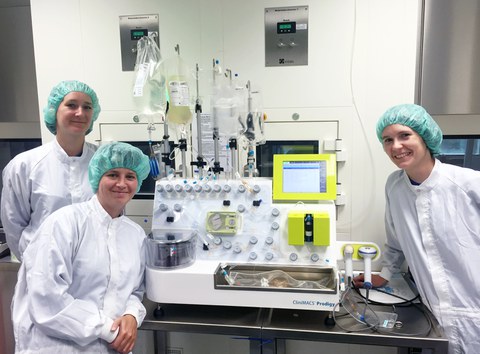May 06, 2019
CRTD researchers bring innovation from bench to bedside

Die Good Manufacturing Practice (GMP) Facility des CRTD
Novel process for the production of suppressive T cells
The Center for Regenerative Therapies (CRTD) at the TU Dresden and the University Hospital Carl Gustav Carus have successfully developed a novel process for the automated proliferation of immunosuppressive cells for therapeutic purposes. This will initially benefit leukaemia patients after stem cell transplantation with severe inflammatory complications.
A central task of the suppressive T cells found in the blood is the regulation of the immune defence, hence the name "Treg" cells. Through this influence, they can prevent the body's immune response from becoming too violent in healthy people. This happens, for example, in autoimmune diseases and chronic inflammatory diseases. The immune system not only attacks pathogens and infected cells, but also healthy tissue cells of the body. According to research results, regulatory T cells can counteract the development or progression of autoimmune diseases and weaken chronic inflammatory diseases. In order to be used as a therapy, however, they must be administered in very high doses by infusion. Since the proportion of cells in the blood is very low, they have to be isolated and subsequently multiplied for therapeutic application.
In a planned clinical study at the Carl Gustav Carus University Hospital, the regulatory T cells will initially be used for the treatment of leukaemia patients. This is specifically for patients suffering from severe chronic graft-versus-host disease (cGvHD). A life-threatening complication affecting 50% of leukaemia patients after stem cell transplantation. Certain cell types of the transplant attack the tissue of the patient and lead to organ damage similar to an autoimmune disease. The aim of the study is to treat these patients with regulatory T-cells from the blood of their healthy stem cell donors at an early stage in order to attenuate or stop tissue destruction.
The production and multiplication of regulatory T cells was developed into a fully automated process in the Good Manufacturing Practice (GMP) Facility of the CRTD, a technology platform for the production of novel drugs. In just two weeks, the CliniMACS Prodigy® system from partner Miltenyi Biotec will perform several fully automated feeding steps and sampling to produce a finished infusion solution. "The infusion bag containing the finished cell product is sterilely separated and sealed and can be brought directly to the patient's bed. This completely closed, standardised manufacturing process minimises the risk of contamination as well as the risk of potential quality deviations compared to the previous manual cell culture," explains project manager Dr. Anke Fuchs.
Prof. Dr. med. Martin Bornhäuser, Director of the Medical Clinic and Polyclinic I of the University Hospital Carl Gustav Carus, emphasizes the advantages of the method: "The individualized application by using the donor's own cells is a look into the future of therapy development. The fact that we can conduct the study together with the CRTD facility at GMP level is a real exceptional feature."
The clinical implementation of the project has been running since 2012 in an exchange between the GMP Facility of the CRTD and the Medical Clinic and Polyclinic I of the University Hospital Carl Gustav Carus. "This fruitful cooperation is a successful example of the close integration of research and clinical therapy in Dresden. With the publication of our automated process, we are laying the foundation for the standardized production of Treg preparations for different patient groups," says Dr. Anke Fuchs.
Publication in Frontiers in Immunology
Media inquiries:
Cornelia Probst
Center for Regenerative Therapies Dresden (CRTD)
Tel.: 0351 458-82065
Friederike Braun
Center for Regenerative Therapies Dresden (CRTD)
Tel.: 0351 458-82064
